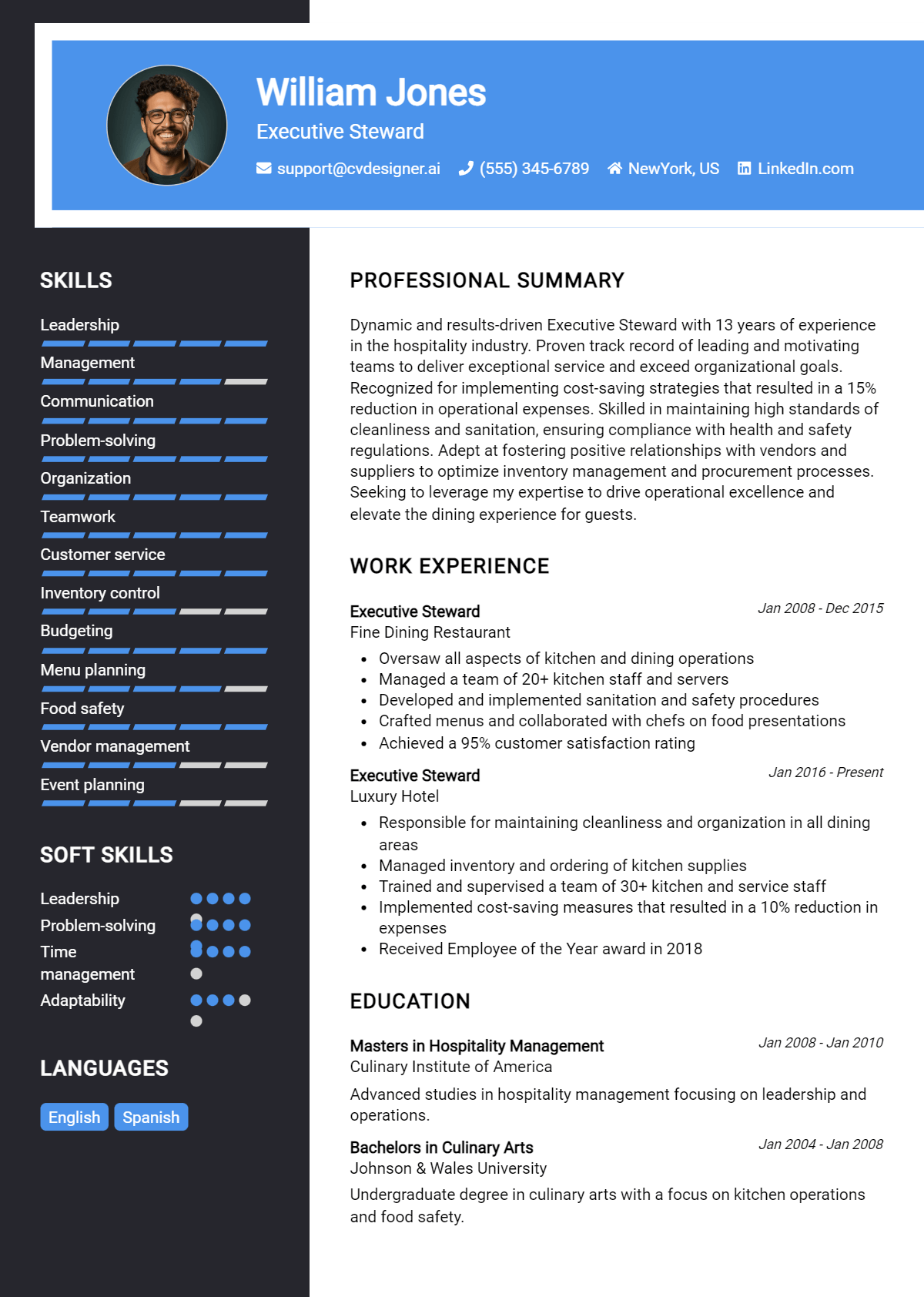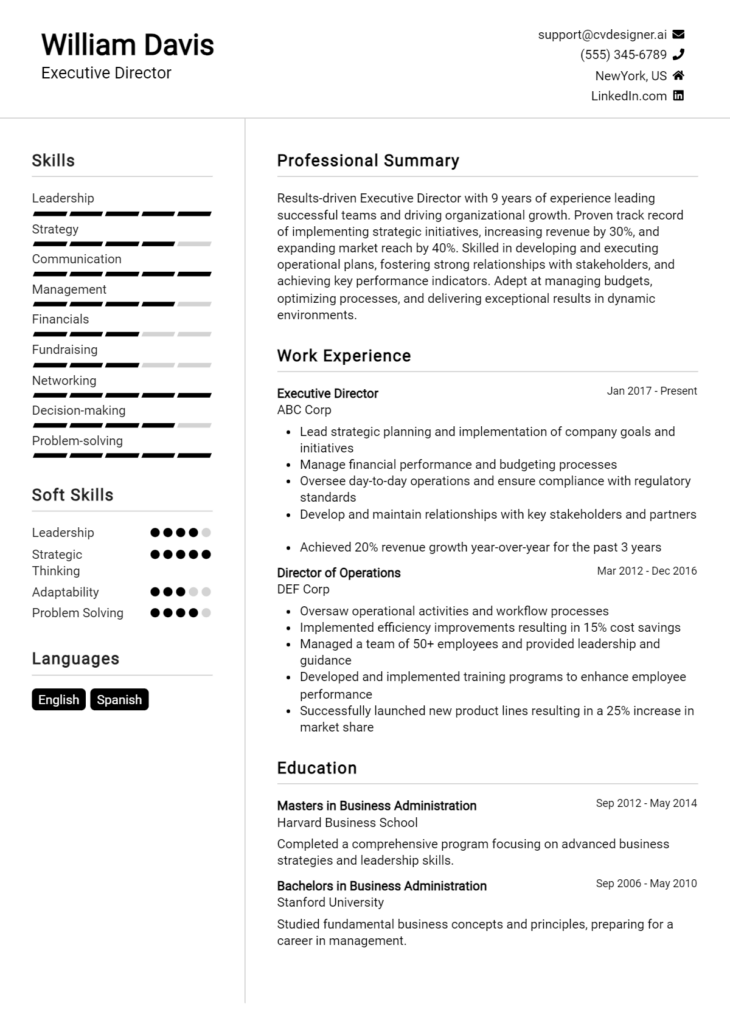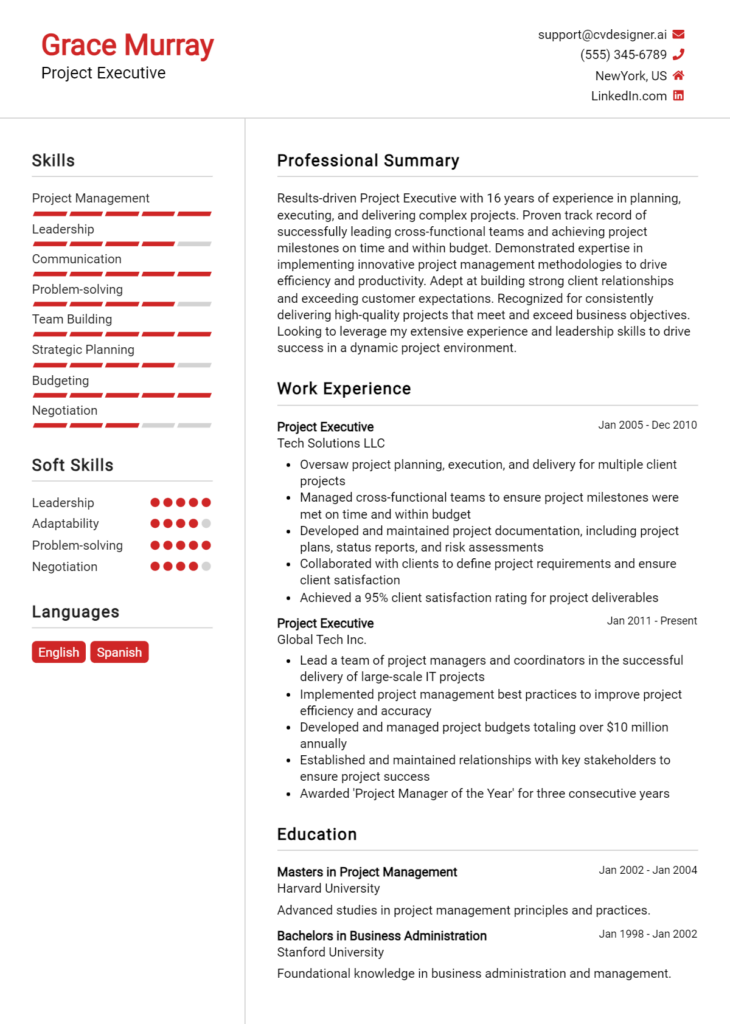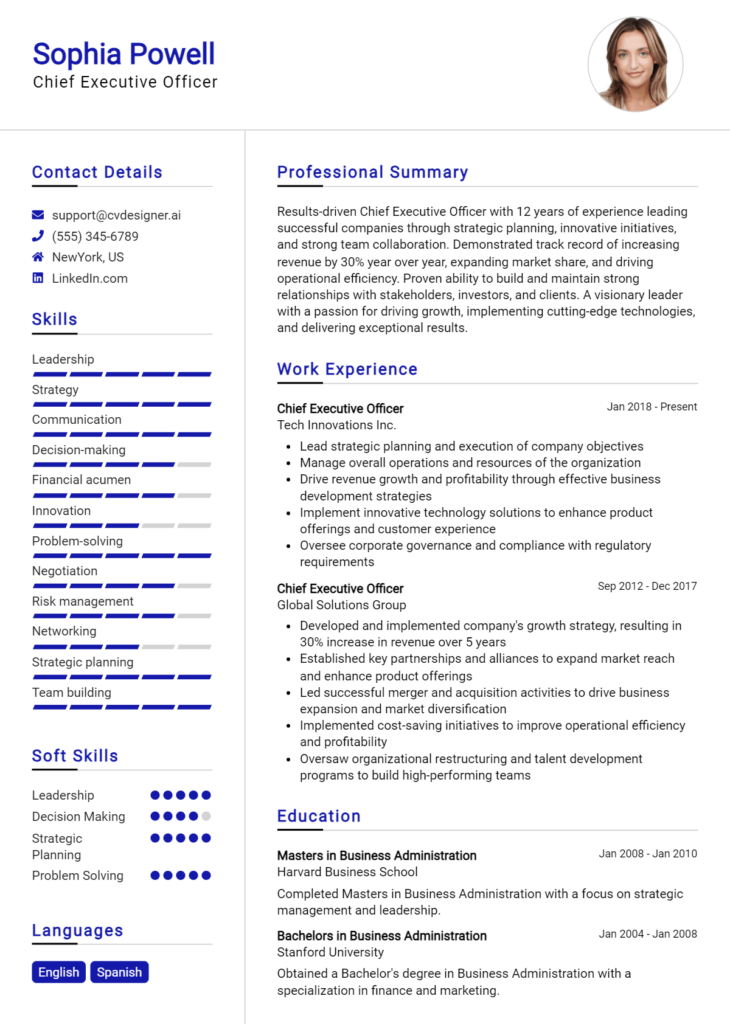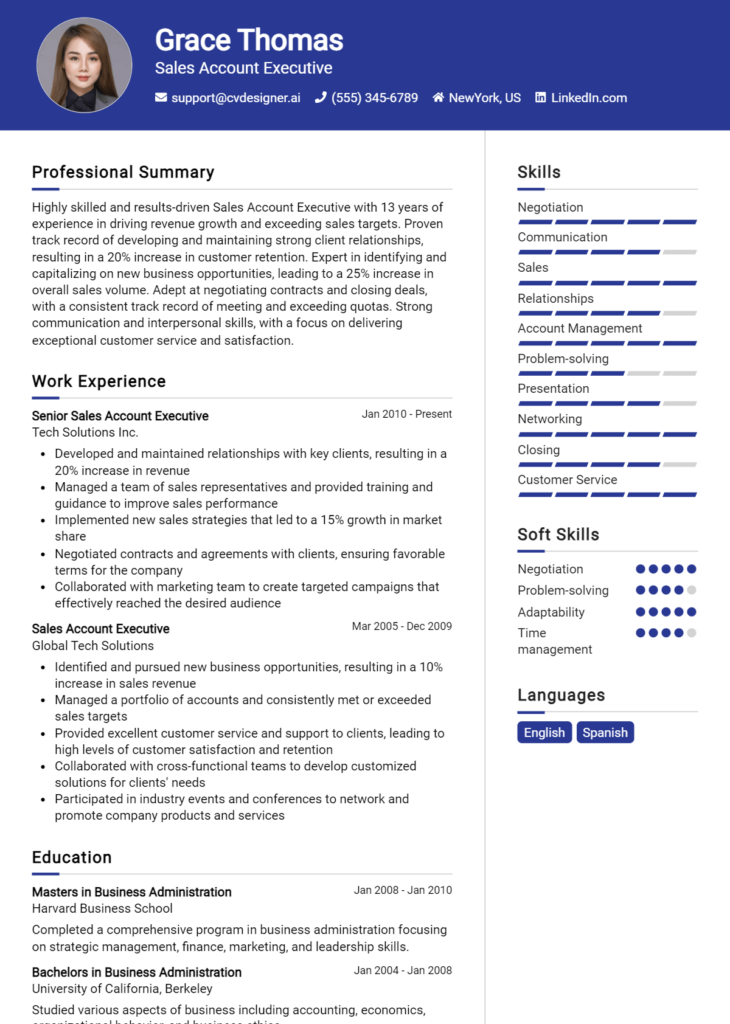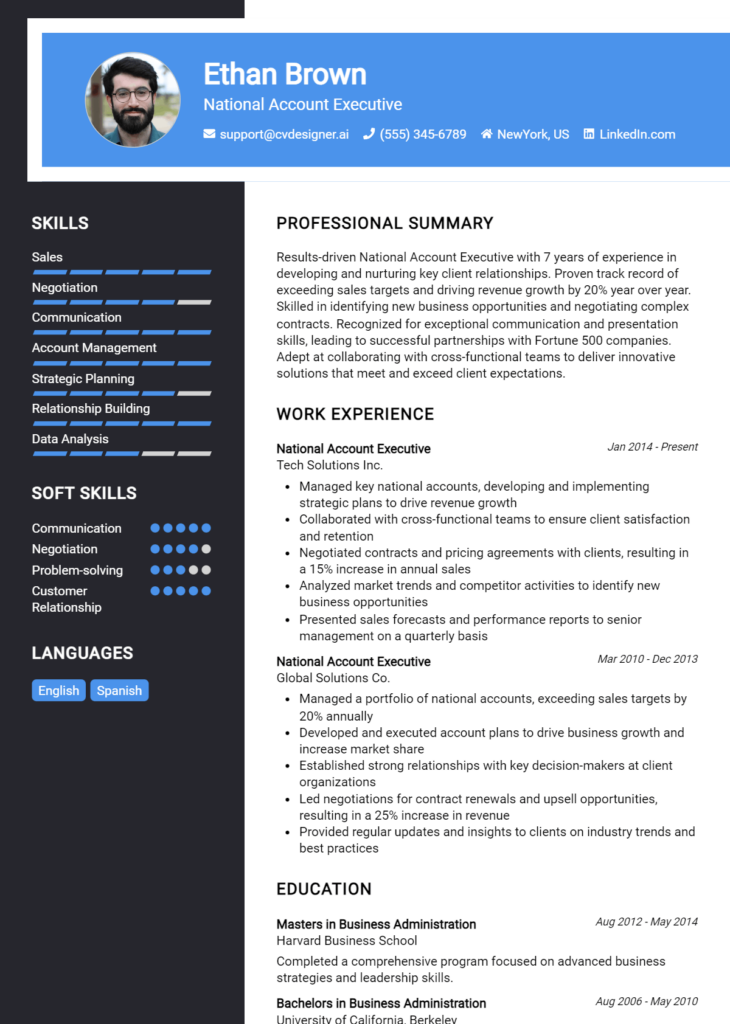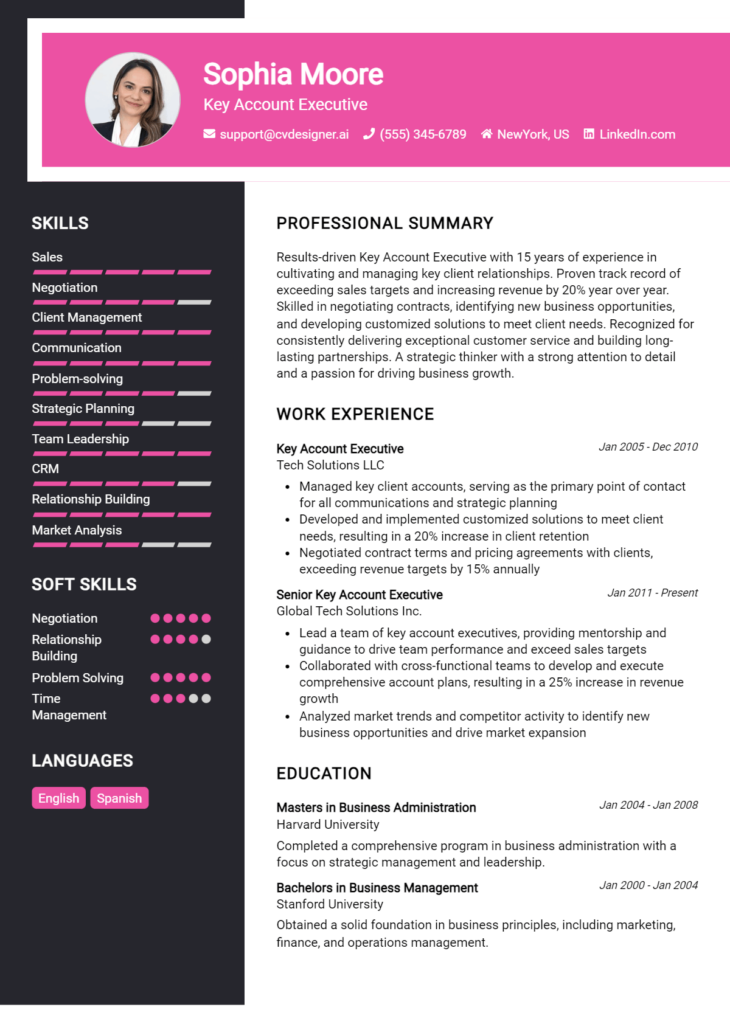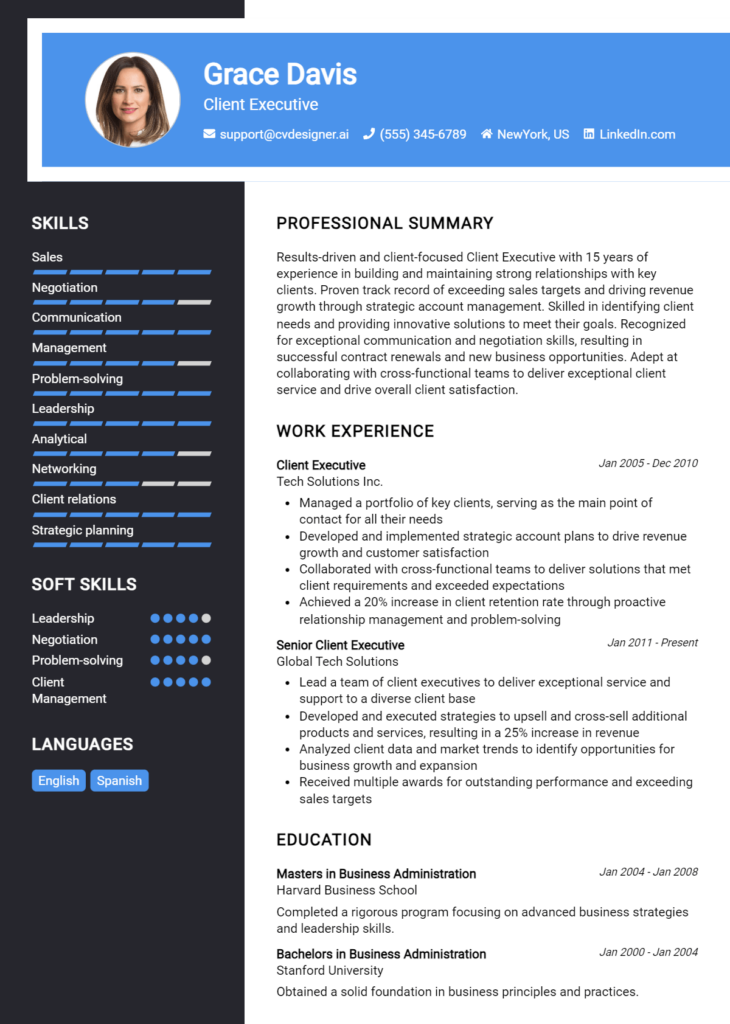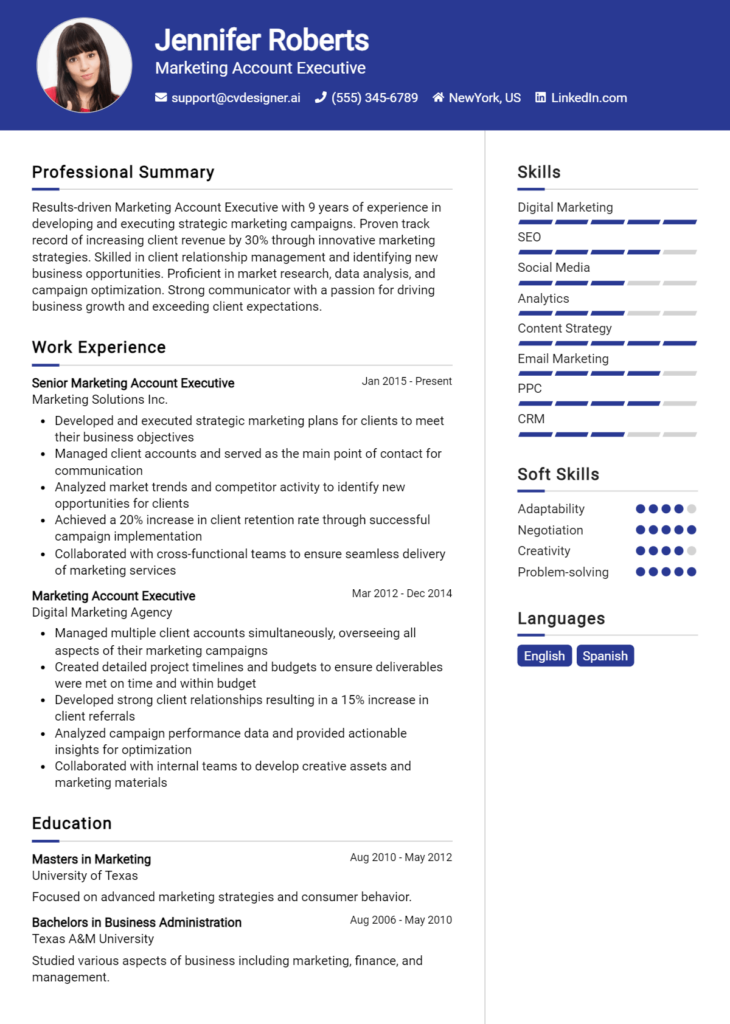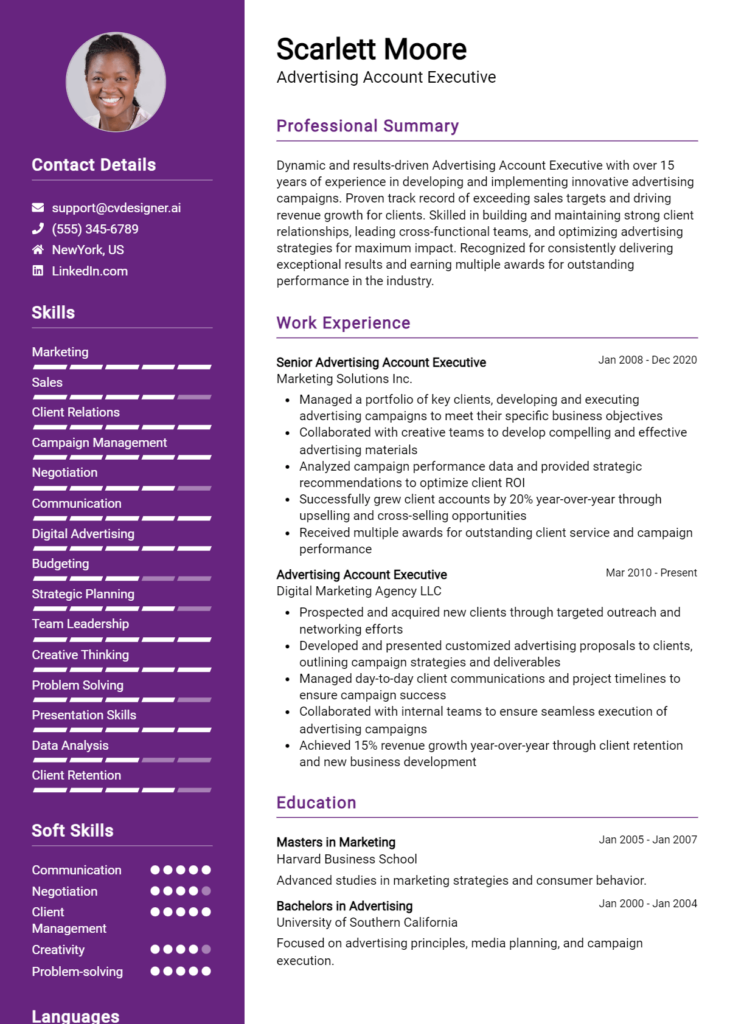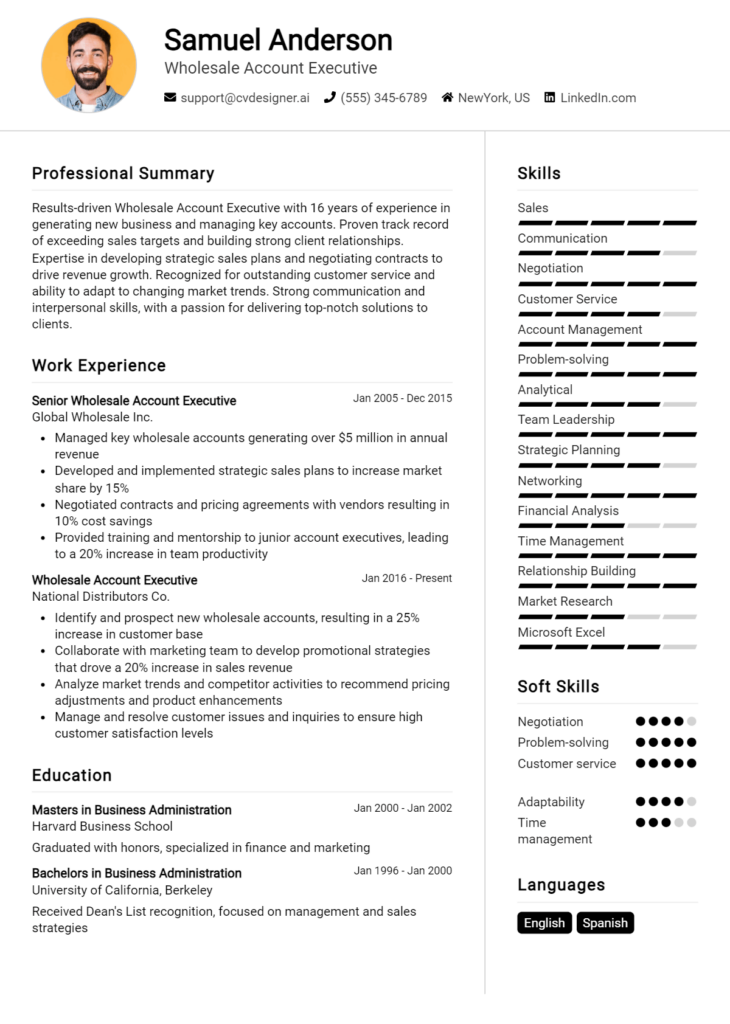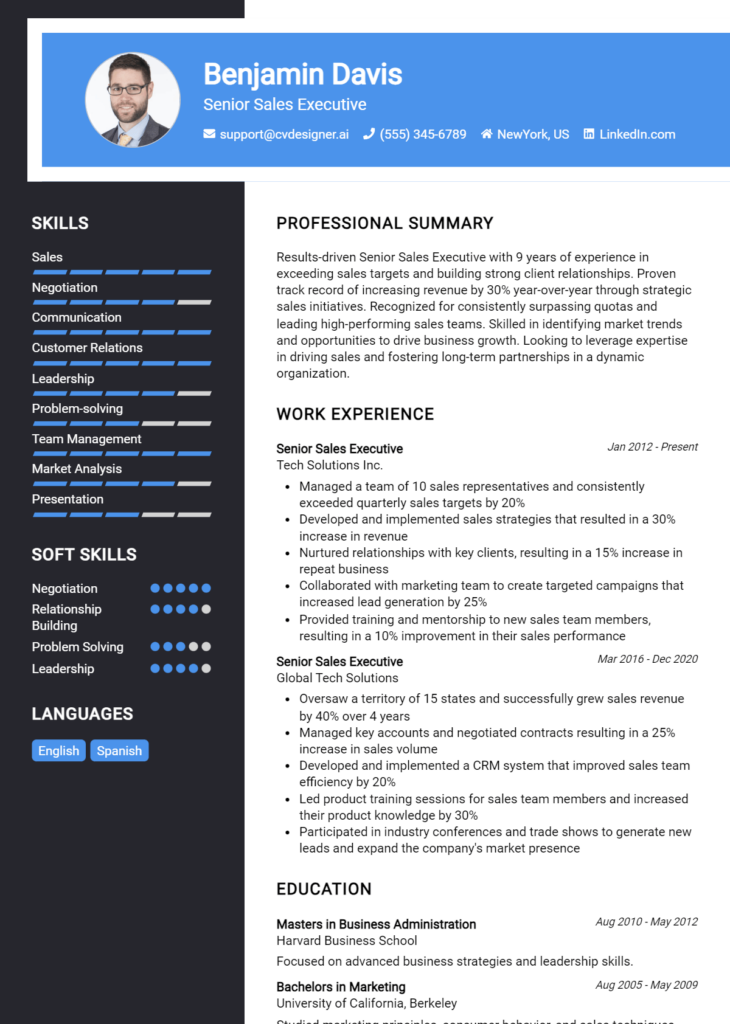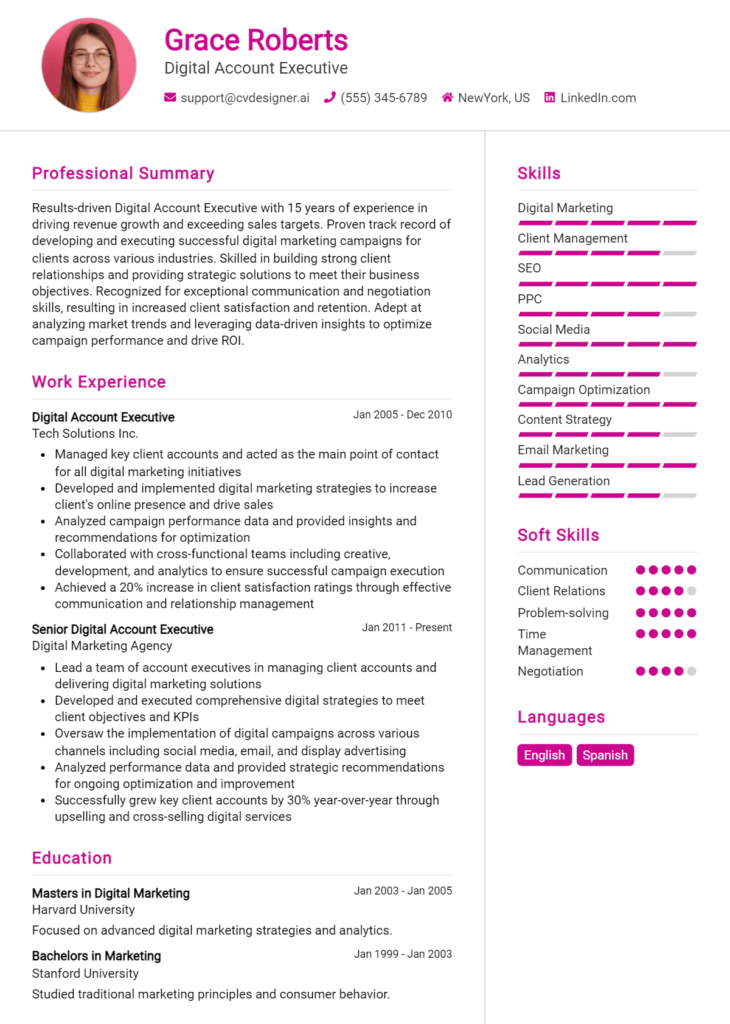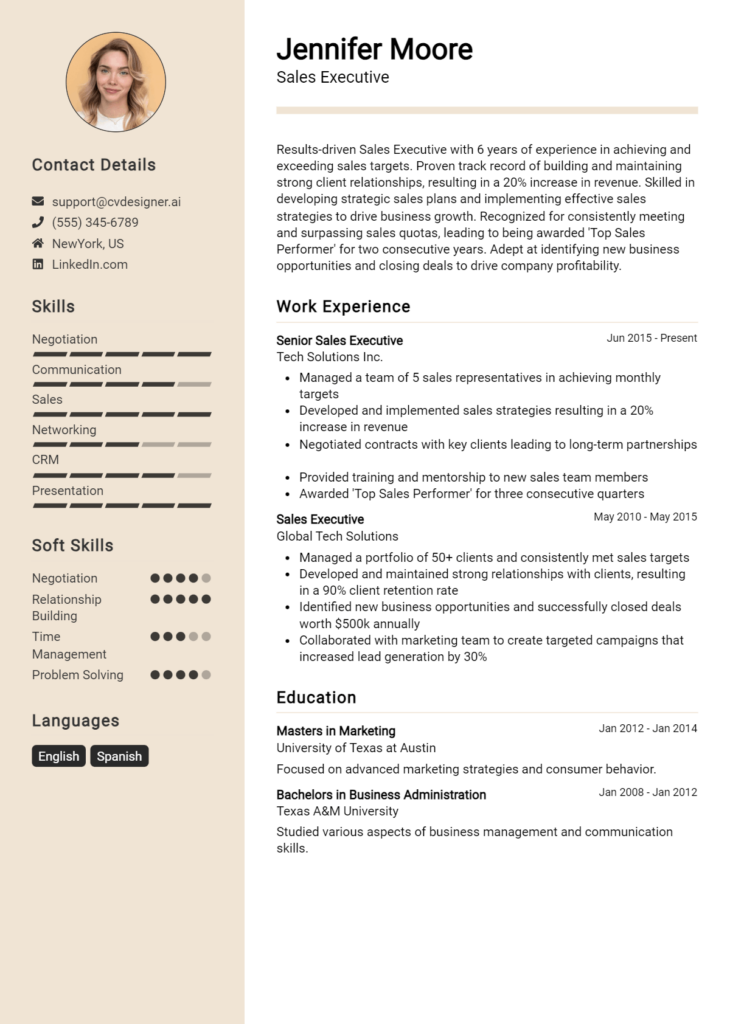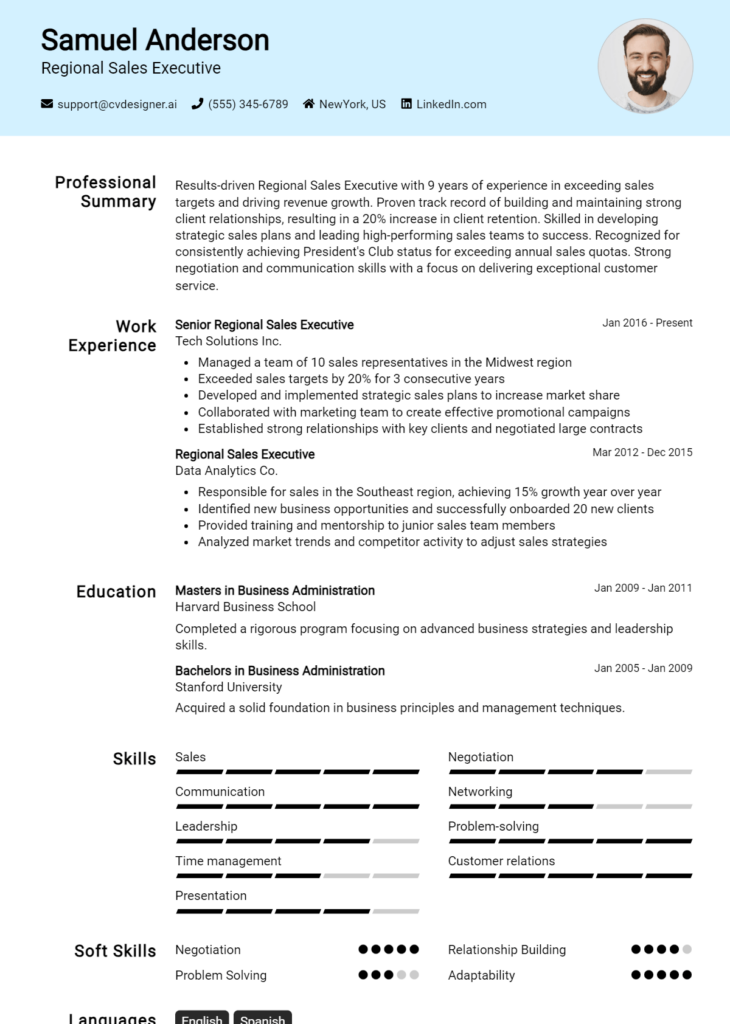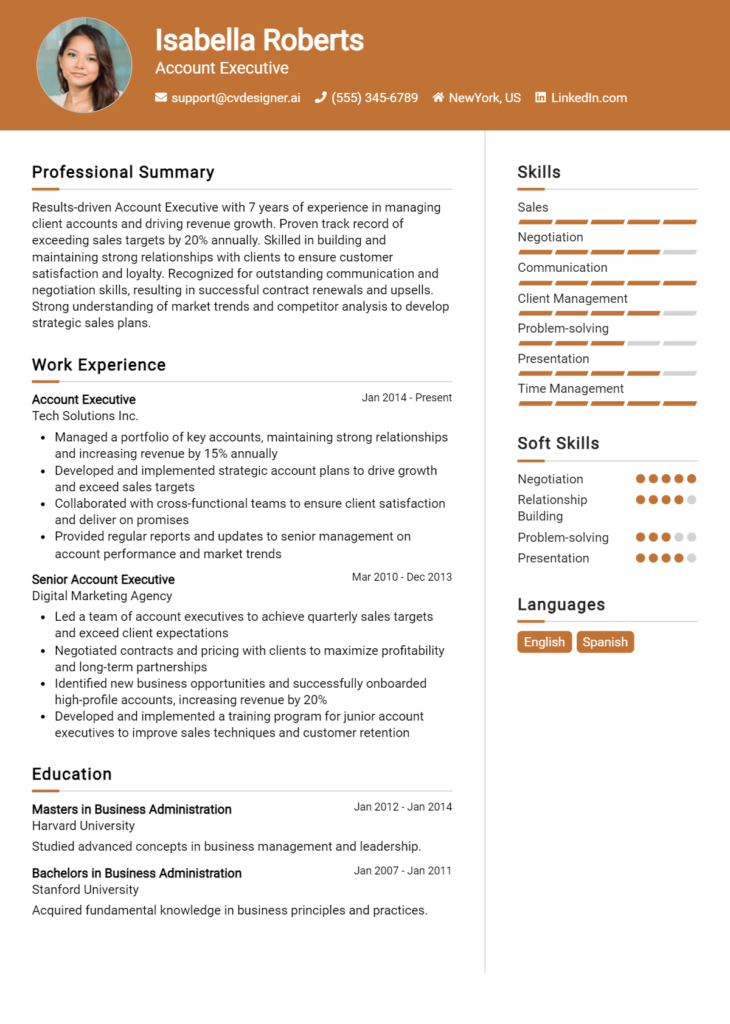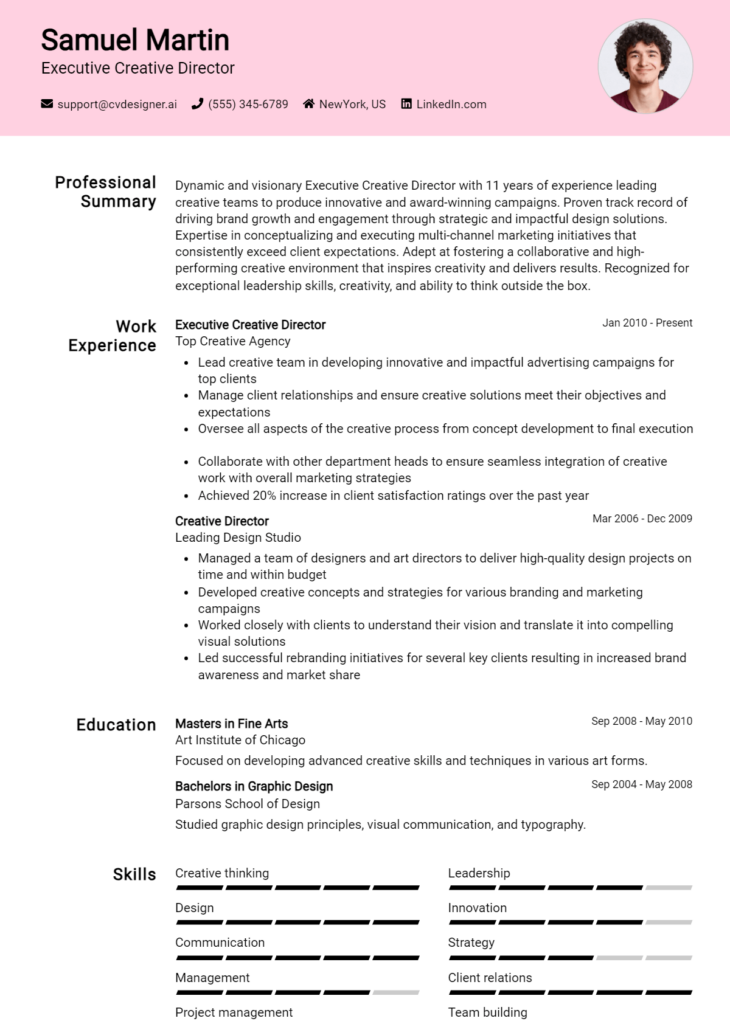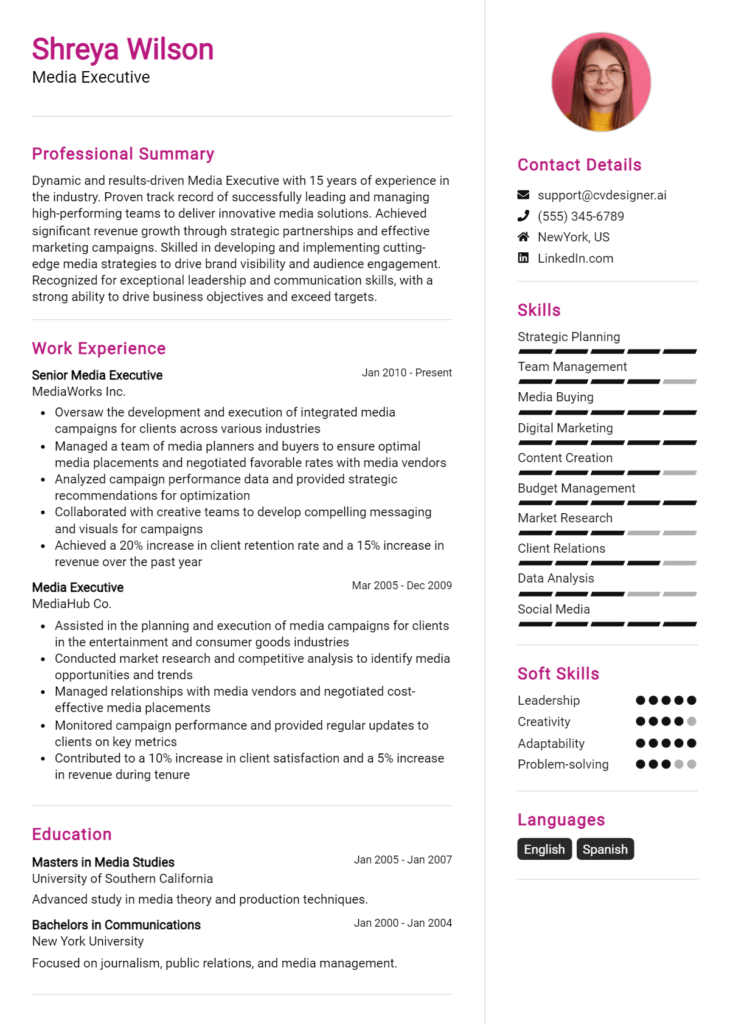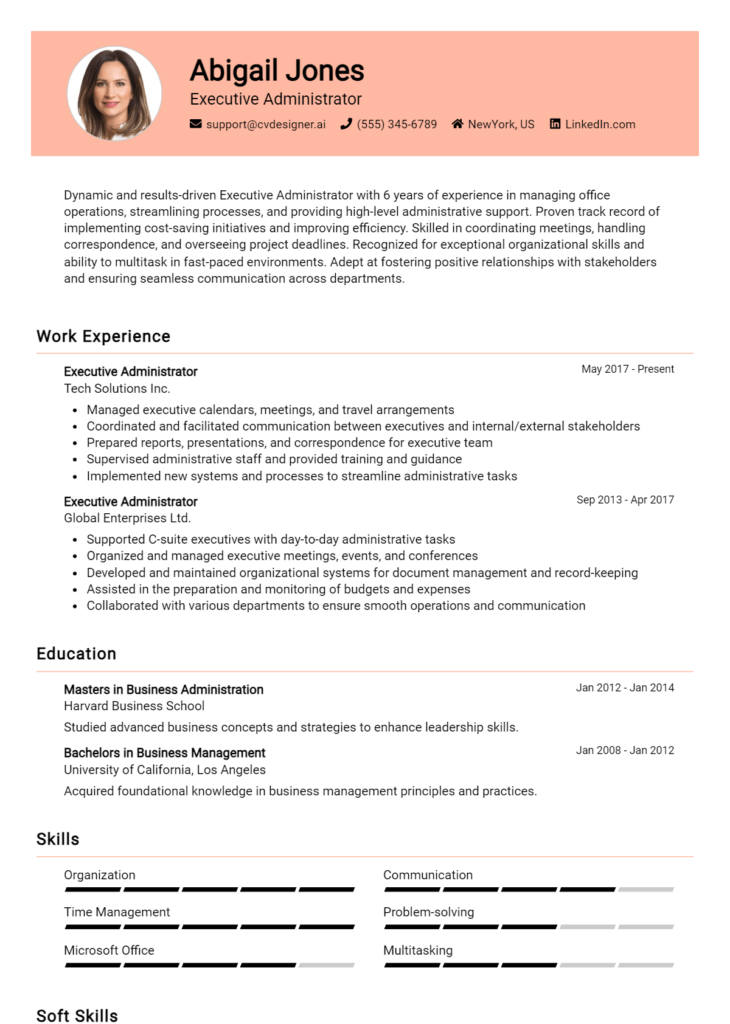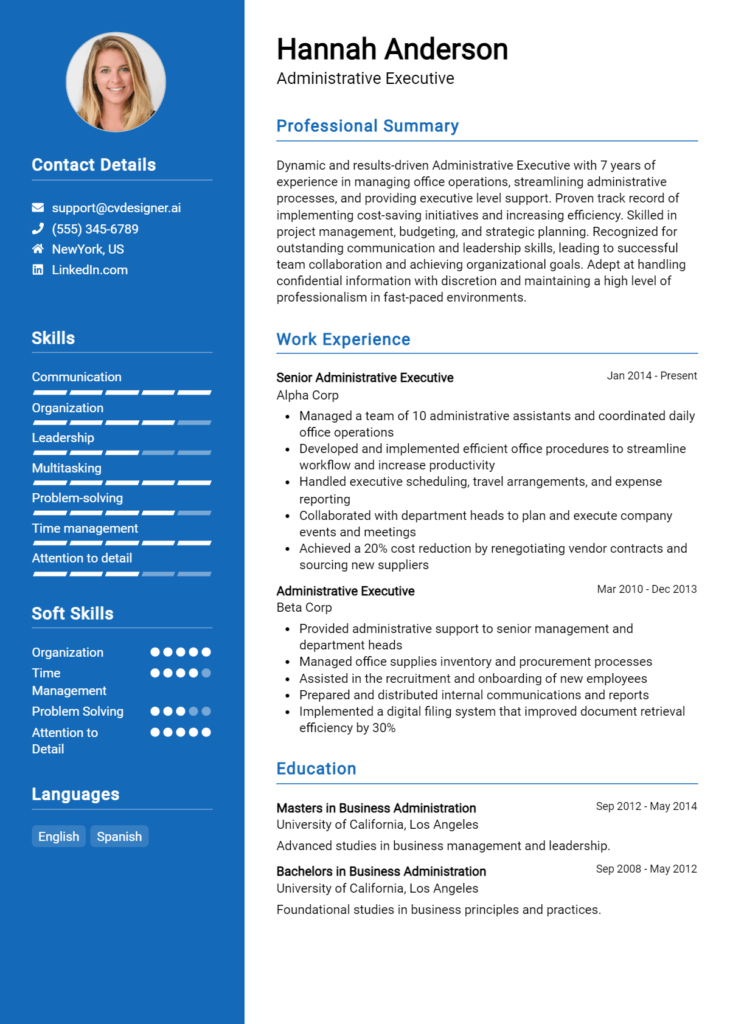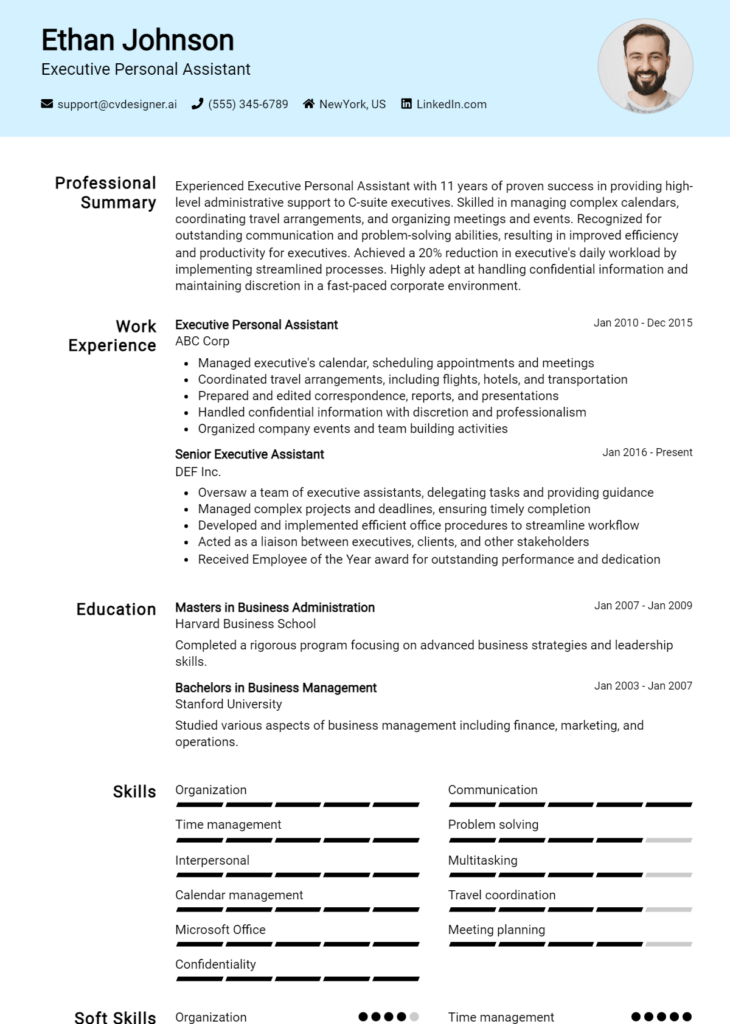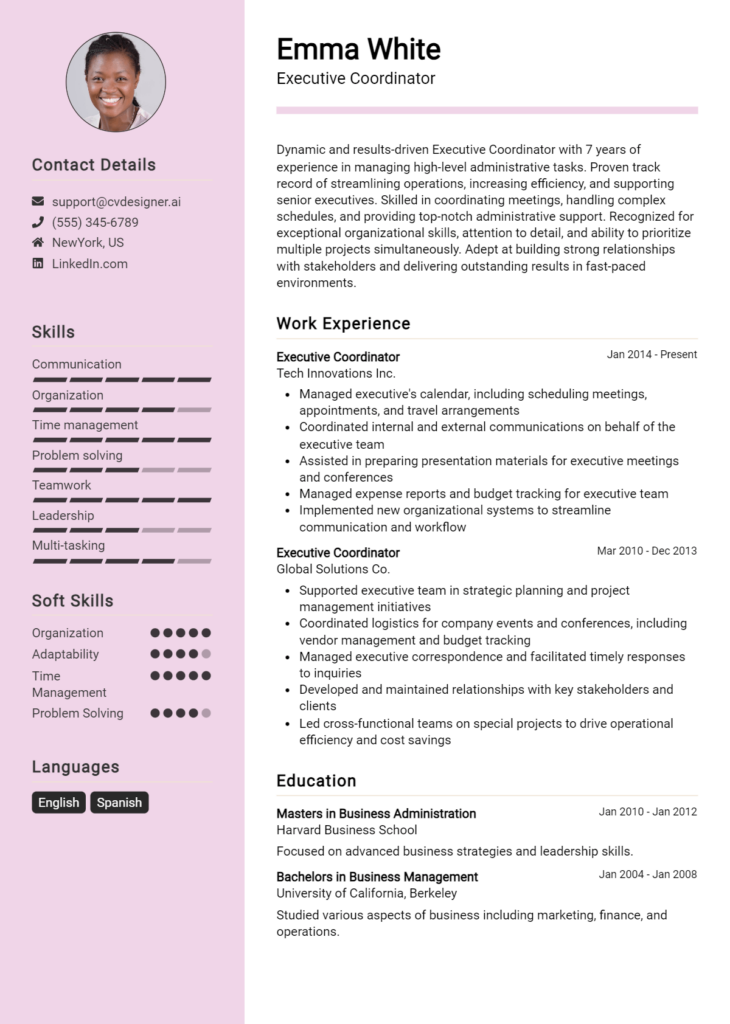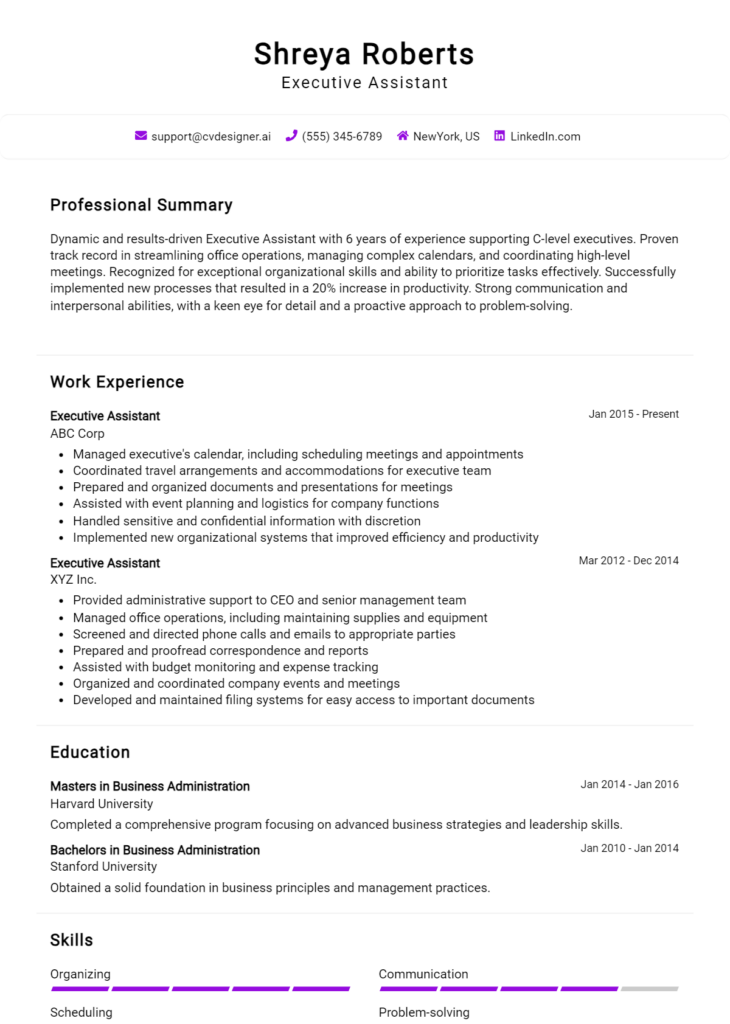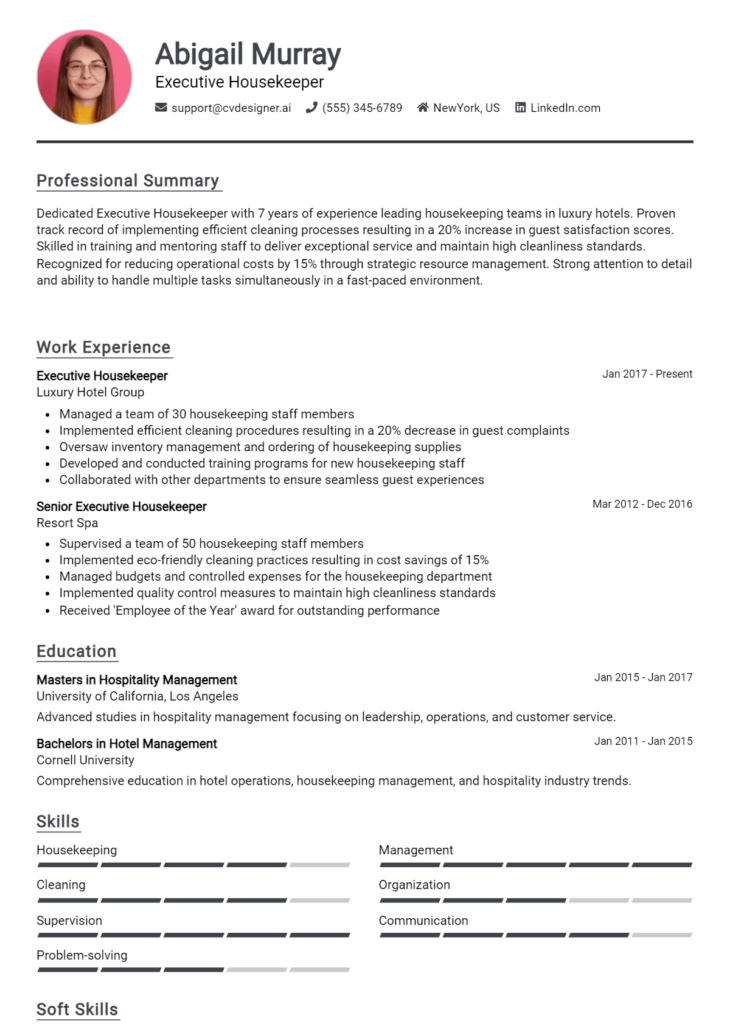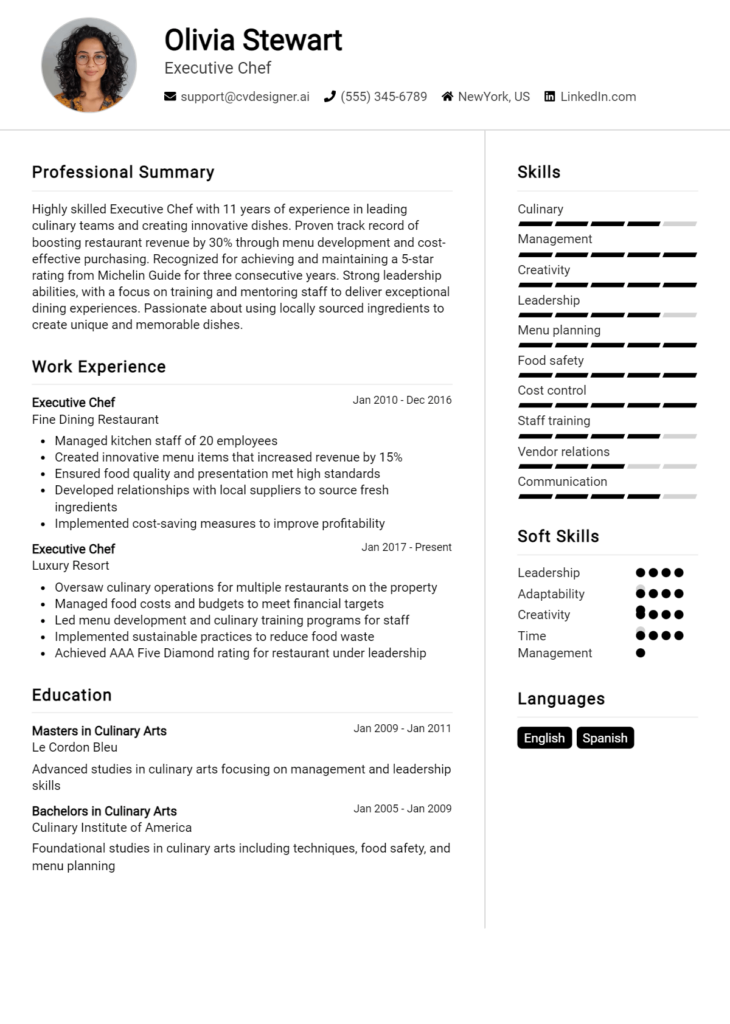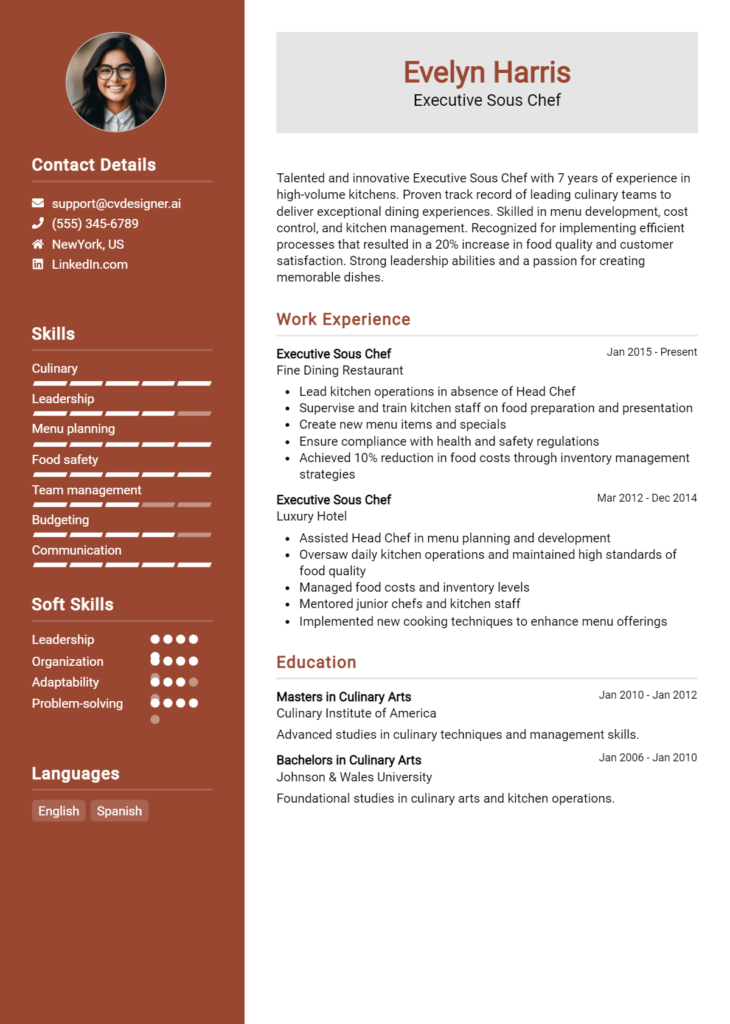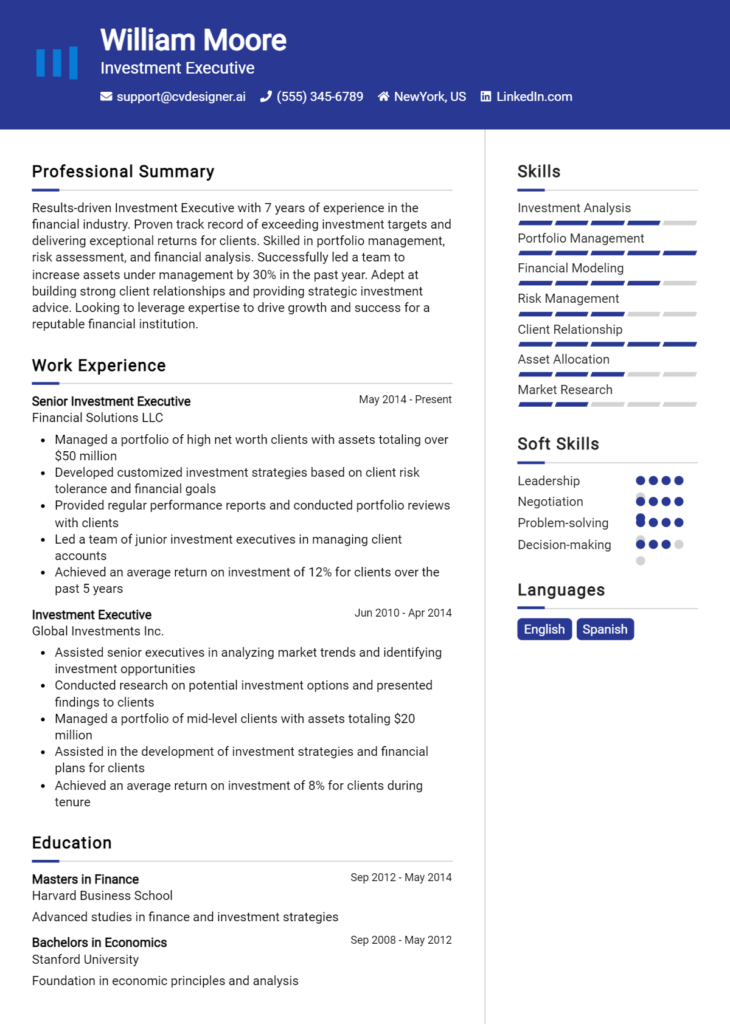Most Popular Executive Steward Resume Examples
Explore additional Executive Steward resume samples and guides and see what works for your level of experience or role.
The role of an Executive Steward is pivotal in the hospitality industry, serving as the backbone of operations in kitchens and dining establishments. This position not only demands exceptional organizational skills but also a keen eye for detail and a commitment to maintaining the highest standards of cleanliness and efficiency. As an Executive Steward, you play a crucial role in ensuring that the culinary team has everything they need to deliver exceptional dining experiences. A well-crafted resume is your ticket to standing out in this competitive field, showcasing your experience and skills in a way that resonates with potential employers.
In this comprehensive resume writing guide, we will delve into the specific responsibilities and essential skills required for an Executive Steward. You’ll learn about the best formats to use that highlight your strengths, as well as common mistakes to avoid that could hinder your chances of landing an interview. We’ll provide resume examples tailored for all levels of experience, from entry-level positions to seasoned professionals. Additionally, we will share valuable tips on effective resume writing, including how to select the right resume templates that align with your personal brand. By the end of this guide, you’ll be equipped with the knowledge and tools to create a standout resume that opens doors to exciting career opportunities in the hospitality sector.
Key Responsibilities and Skills for a Executive Steward
As an Executive Steward, the primary responsibilities revolve around overseeing the cleanliness and organization of kitchen and dining areas, ensuring that all kitchen operations run smoothly, and maintaining high standards of hygiene and sanitation. This role also involves managing the stewarding team, coordinating with other departments, and maintaining inventory of cleaning supplies and kitchen equipment. The Executive Steward is crucial in creating a safe and efficient working environment, contributing to the overall guest experience in hospitality settings.
Key Responsibilities:
- Supervise the kitchen and dining area cleaning staff.
- Ensure compliance with health and safety regulations.
- Maintain inventory of cleaning supplies and kitchen equipment.
- Coordinate with chefs and other departments to ensure smooth operations.
- Develop and implement cleaning schedules and procedures.
- Conduct staff training on proper cleaning techniques and safety protocols.
- Monitor and manage budgets related to cleaning supplies and equipment maintenance.
Essential Skills:
- Strong leadership and team management abilities.
- Excellent organizational skills.
- Knowledge of health and safety regulations.
- Ability to communicate effectively with staff and management.
- Problem-solving skills and attention to detail.
- Proficiency in inventory management.
- Time management skills to prioritize tasks efficiently.
Highlighting these skills effectively in the resume skills section is crucial for prospective employers. Tailoring the listed responsibilities and skills to align with the specific job description can significantly enhance the chances of securing an interview. Additionally, consider how these skills can be presented in a strong CV, showcasing relevant experience and achievements that demonstrate your capability to fulfill the Executive Steward role successfully.
Best Resume Format and Structure for a Executive Steward
When crafting a resume for the role of an Executive Steward, it's important to choose a format that highlights your experience, skills, and qualifications effectively. Here’s a detailed guide on the best resume format and structure to help you stand out.
Contact Information
- Name: Your full name should be prominently displayed at the top.
- Phone Number: Include a reliable number where you can be reached.
- Email Address: Use a professional email address.
- LinkedIn Profile (optional): If applicable, include a link to your LinkedIn profile for additional insights into your professional history.
- Location: City and state (optional, but can be helpful).
Professional Summary
- Write a brief, impactful summary (2-4 sentences) that highlights your key qualifications and career objectives. Tailor this section to reflect your experience in managing stewarding operations, overseeing cleanliness, and ensuring compliance with health standards. Focus on your leadership skills and any unique value you bring to the role.
Work Experience
- List your work experience in reverse chronological order, starting with your most recent job. Each entry should include:
- Job Title: Clearly state your position (e.g., Executive Steward).
- Company Name: Include the name of the establishment.
- Location: City and state of the company.
- Dates of Employment: Month and year started and ended.
- Key Responsibilities and Achievements: Use bullet points to describe your main responsibilities and any notable achievements. Start each bullet point with an action verb and quantify results where possible (e.g., “Implemented a new cleaning protocol that reduced labor costs by 15%”).
Education
- List your educational background with the following details:
- Degree: Specify the degree earned (e.g., Bachelor’s in Hospitality Management).
- Institution Name: Include the name of the college or university.
- Graduation Date: Mention the month and year of graduation.
Skills
- Highlight relevant skills that are essential for an Executive Steward role. This may include:
- Leadership and team management
- Knowledge of health and safety regulations
- Inventory management
- Excellent communication skills
- Problem-solving abilities
- Familiarity with cleaning techniques and equipment
Certifications
- Include any relevant certifications that would enhance your candidacy. This could include:
- Food Safety Certification
- Hospitality Management Certification
- Any other industry-specific training or certifications
Format Tips
- Font Choice: Use a clean, professional font (e.g., Arial, Calibri, Times New Roman) in 10-12 point size for readability.
- Margins: Keep standard 1-inch margins to ensure your resume is not overcrowded.
- Length: Aim for a one-page resume unless you have extensive experience.
- Consistency: Ensure a consistent format for headings, bullet points, and spacing.
Complementing Cover Letter Format The format of your resume should complement your cover letter. When writing your cover letter:
- Use the same header as your resume for a cohesive look.
- Maintain the same font style and size for professionalism.
- In the cover letter, elaborate on your experiences mentioned in your resume, providing context and demonstrating your passion for the role.
By following this structured approach, your resume will present a clear, professional image that aligns with your qualifications and the expectations for the Executive Steward position.
Writing Tips and Best Practices for a Executive Steward Resume
When crafting a resume for the Executive Steward position, it's essential to present a polished and professional document that effectively showcases your skills and experiences in hospitality management and kitchen operations. Begin by tailoring your resume to reflect the specific requirements and responsibilities outlined in the job description. Utilize strong action verbs to convey your contributions, and be sure to quantify your achievements wherever possible—such as stating the number of staff managed or improvements in operational efficiency—this adds credibility to your claims. Incorporating industry-specific keywords will also enhance your resume's visibility in applicant tracking systems, making it more likely to land in the hands of hiring managers. Always ensure your resume adheres to best practices for layout and design to create a visually appealing document. It's also worthwhile to think about how these resume writing practices can translate into your cover letter, ensuring consistency and professionalism across your application materials.
- Use action verbs like "coordinated," "managed," and "implemented" to describe your responsibilities.
- Quantify your achievements (e.g., "reduced costs by 15%" or "led a team of 20 staff").
- Incorporate industry-specific keywords to align with the job description.
- Keep the layout clean and professional, using consistent formatting and font styles.
- Highlight relevant certifications or training in hospitality management or food safety.
- Tailor your resume for each job application to emphasize the most relevant experiences.
- Include a summary statement that encapsulates your strengths and career goals.
- Proofread for errors and ensure clarity to maintain a professional tone.
For further guidance, consider exploring resume writing tips to refine your document. Additionally, think about how these practices can enhance your cover letter to create a cohesive and compelling application.
Common Mistakes to Avoid in a Executive Steward Resume
When crafting a resume for the role of Executive Steward, it's crucial to present your qualifications and experience in the best light possible. However, many applicants fall into common pitfalls that can detract from their overall appeal. A well-structured resume not only highlights relevant skills and accomplishments but also avoids clichés and unnecessary information. To ensure your resume stands out for the right reasons, be mindful of these common mistakes:
- Overloading your resume with excessive information that dilutes key points.
- Using generic job descriptions that fail to showcase your unique contributions.
- Failing to tailor your resume for the specific Executive Steward position.
- Ignoring proper formatting, which can lead to a cluttered and unprofessional appearance.
- Listing duties instead of achievements, missing the opportunity to demonstrate impact.
- Neglecting to include relevant certifications or training that enhance your qualifications.
- Using outdated or incorrect contact information, making it hard for employers to reach you.
- Including irrelevant personal information that doesn't pertain to the job.
- Not proofreading for grammatical errors or typos, which can undermine your professionalism.
- Overusing technical jargon that may not be familiar to all hiring managers.
For more insights on how to refine your resume, consider reviewing the common mistakes to avoid in a resume. Additionally, don't overlook the importance of a compelling cover letter; check out the common cover letter mistakes to ensure your application is complete and effective.
Sample Executive Steward Resumes
As an Executive Steward, your role is crucial in maintaining the cleanliness, organization, and overall efficiency of a kitchen and dining area. This position requires a blend of leadership, management skills, and a keen eye for detail. Below are three sample resumes tailored to different experience levels in the Executive Steward role. Whether you are an experienced professional, an entry-level candidate, or someone transitioning from another career, these examples can guide you in crafting your resume.
Experienced Executive Steward Resume
John Doe
123 Culinary Lane
Gastronomy City, ST 12345
(123) 456-7890
johndoe@email.com
Professional Summary
Dedicated Executive Steward with over 10 years of experience in high-volume kitchens. Proven track record in managing kitchen operations, ensuring compliance with health and safety standards, and leading a team to achieve exceptional cleanliness and efficiency. Strong organizational skills and a commitment to excellence.
Work Experience
Executive Steward
Luxury Resort & Spa, Gastronomy City, ST
January 2018 - Present
- Oversee daily operations of the kitchen and dining area, ensuring cleanliness and organization.
- Manage a team of 15 stewards, providing training and support to enhance productivity.
- Implement new cleaning protocols that reduced health violations by 30%.
- Collaborate with chefs to maintain high standards of food safety and sanitation.
Stewarding Manager
Fine Dining Restaurant, Culinary Town, ST
June 2015 - December 2017
- Directed the stewarding department for a prestigious restaurant, enhancing operational efficiency.
- Developed a waste management program, reducing costs by 20%.
- Coordinated with suppliers for inventory management and procurement of cleaning supplies.
Education
Certificate in Culinary Arts
Culinary Institute of Gastronomy, Culinary Town, ST
Graduated: May 2015
Entry-Level Executive Steward Resume
Jane Smith
456 Kitchen Ave
Culinary Village, ST 67890
(987) 654-3210
janesmith@email.com
Professional Summary
Motivated and detail-oriented individual seeking an entry-level Executive Steward position. Strong passion for the culinary arts and a commitment to maintaining a clean and organized kitchen environment. Eager to learn and contribute to a dynamic team.
Work Experience
Kitchen Assistant
Casual Dining Restaurant, Culinary Village, ST
May 2022 - Present
- Assisted in maintaining cleanliness and organization in the kitchen and dining area.
- Supported chefs by washing dishes and preparing kitchen utensils for daily use.
- Complied with health and safety regulations while performing various kitchen tasks.
Volunteer Kitchen Staff
Community Center, Culinary Village, ST
January 2021 - April 2022
- Helped prepare meals for community events, ensuring kitchen cleanliness.
- Assisted in organizing food inventory and supplies, promoting efficient operations.
- Engaged in training sessions on food safety and hygiene standards.
Education
High School Diploma
Culinary Village High School, Culinary Village, ST
Graduated: June 2021
Career Changer Executive Steward Resume
Michael Brown
789 Transition Blvd
Culinary Bay, ST 13579
(321) 654-9870
michaelbrown@email.com
Professional Summary
Dynamic professional with a background in hospitality management transitioning to an Executive Steward role. Strong leadership skills and a commitment to maintaining high standards of cleanliness and efficiency in kitchen operations. Seeking to leverage transferable skills to contribute to a fast-paced culinary environment.
Work Experience
Front Desk Manager
Hospitality Inn, Culinary Bay, ST
March 2019 - Present
- Managed day-to-day operations of the front desk, ensuring exceptional guest services.
- Trained and supervised a team of 10 staff members, enhancing team performance and guest satisfaction.
- Developed and implemented standard operating procedures for cleanliness and organization.
Customer Service Representative
Retail Store, Culinary Bay, ST
June 2016 - February 2019
- Provided excellent customer service and managed inventory for a busy retail environment.
- Assisted in training new employees on store policies and cleaning standards.
Education
Bachelor of Science in Hospitality Management
Culinary University, Culinary Bay, ST
Graduated: May 2016
For more inspiration, consider exploring additional resume templates. Additionally, corresponding cover letter examples can help create a complete job application package.
Checklist for a Executive Steward Resume
- Proofread for Errors: Carefully read through your resume to catch any spelling, grammar, or punctuation mistakes. A polished resume reflects attention to detail.
- Check for Consistency: Ensure that font styles, sizes, and formatting are consistent throughout the document. This includes heading sizes, bullet points, and spacing.
- Tailor Your Resume: Customize your resume for the Executive Steward position by incorporating keywords from the job description. Highlight relevant experience and skills that align with the role.
- Highlight Relevant Experience: Focus on your experience in food and beverage management, inventory control, and team leadership. Use quantifiable achievements to demonstrate your impact.
- Include Certifications: If applicable, add any relevant certifications, such as food safety or hospitality management, to enhance your qualifications.
- Use Action Verbs: Start bullet points with strong action verbs to convey your accomplishments effectively. Words like "managed," "coordinated," and "led" can make a significant impact.
- Optimize for ATS: Ensure your resume is ATS-friendly by using standard headings and avoiding overly complex formatting. This increases the chances of your resume being seen by hiring managers.
- Keep It Concise: Aim for a one-page resume if you have less than 10 years of experience. Focus on the most relevant information to keep the reader engaged.
- Seek Feedback: Before finalizing your resume, get feedback from peers or mentors in the hospitality industry. They may offer valuable insights and suggestions for improvement.
- Consider Using an AI Resume Builder: Utilize an AI resume builder to organize all elements of your resume effectively. This tool can help ensure a professional layout and structure.
For a comprehensive job application, you can also follow a similar checklist when creating a CV or cover letter.
Key Takeaways for a Executive Steward Resume Guide
In conclusion, crafting a strong Executive Steward resume is essential to standing out in a competitive job market. By utilizing the examples and tips provided in this guide, you can effectively showcase your skills, experiences, and achievements in a way that resonates with potential employers. To take the next step in your job application process, consider downloading a tailored resume template from resume templates, creating a compelling cover letter using our cover letter templates, or exploring our user-friendly resume maker for a polished finish. Remember, adhering to similar guidelines will also enhance your CV and cover letter, ensuring that every aspect of your application is cohesive and professional. Start your journey towards securing your dream job today!
